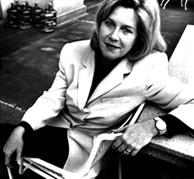
On the 1992 campaign trail, a special bond formed between two people who share the same birthday and a similar conviction that if they could just talk to everyone in the country — in person — everything would be all right. But the real connection between Tipper Gore and Bill Clinton was cemented when they talked about their mothers. During late-night bus rides across the nation, Clinton told her about being cared for by his grandparents while his mother returned to school. Gore, who had also lived with her grandparents as a child, spoke about a subject she rarely discussed — her mother’s struggle with clinical depression. Clinton’s response won her over forever: He asked her to be his mental health adviser.
Now 48, Mary Elizabeth Gore is a mother of four who set aside her own plans to become a psychologist in order to fulfill her role as a political wife. Despite her accomplishments and the fact that she is married to a second-term vice president with presidential ambitions, she is perhaps still best-known for her fight in the late 1980s to make the recording industry put warning labels on violent or sexually explicit material. For that, she was pilloried as a frigid housewife (“Ah, Tipper, c’mon,” sang Joey Ramone. “Ain’t you been getting it on?”) and was called a “cultural terrorist” by Frank Zappa.
As second lady, Gore has successfully pursued her two passions: photography and psychology. She recently published Picture This: A Visual Diary, an intimate collection of photographs taken over the last four years. And she has made mental health her signature issue, lobbying to increase health care benefits and, more recently, advocating for the mentally ill homeless.
Tipper Gore sat for a Mother Jones interview with Carl M. Cannon, White House correspondent for the Baltimore Sun:
Q: In the waning days of last year’s campaign, your husband was really connecting with audiences. Was this the beginning of Al Gore’s run for the presidency in 2000? Are you the first-lady-in-waiting?
A: I’m not in waiting for anything. I take each day for all it has to offer. Most of the time I’m either doing something for someone in the field of mental health, or for the homeless. That’s where I am going to continue to focus over the next four years.
Q: When you and Hillary Clinton are together, you smile a lot, you hug, you whisper to each other and laugh. You compliment each other profusely in public. Do you two really get along that well?
A: We really get along that well. We’re very compatible. We’re mothers; we talk about family issues. And she’s got a very good sense of humor. Heck, if she’ll laugh at my jokes, I’ll keep telling them to her.
Q: You chose different paths, though.
A: Oh yeah.
Q: She went to law school and was a practicing lawyer. You didn’t get your degree in psychology as you had planned, but gave it up for Al.
A: I did get a master’s degree in psychology. I always thought about getting my Ph.D. — so I could work in private practice and teach — but I gave up that part of my goal when my husband was elected to Congress in 1976.
 Q: Do you ever regret that decision?
Q: Do you ever regret that decision?
A: No. I feel that as someone who has been able to articulate a lot of mental health issues to Congress, I’ve had a real impact on legislation that will help people with mental illness.
Q: What will you do in terms of trying to get progressive legislation on mental health — such as increasing mental health benefits — passed in the upcoming Congress?
A: I will continue to take a bipartisan approach, working with mental health groups in the House and Senate. There’s a lot of work left to be done.
Q: Are Republicans hostile to you on the mental health issue?
A: Some Republicans are hostile on this issue of benefits simply because it doesn’t fit into their ideology. Others, like [New Mexico] Senator Pete Domenici, couldn’t be more supportive. I will continue to work with allies that I already have on the Republican side of the aisle, as well as the Democrats, and I’m also hoping to get a positive response from the new members of Congress. If I don’t get a positive response, then I know where they stand — they’re simply not going to do anything on mental health because it doesn’t fit in their philosophy of letting big business have full reign over, say, the insurance companies.
Q: You have said that one of the reasons you are so interested in psychology is because you witnessed your mother’s depression when you were a girl. Back then, it was something people just didn’t speak about. Do you think people still have trouble speaking about depression?
A: Yes, it’s still a problem. Almost one in four adults deals with some sort of mental health issue. I want to spread the word that it can happen to your family, your neighbor, your relative. I want people to understand depression like they understand cancer or heart disease. I’m always trying to increase awareness of mental health issues — that’s why every year I act as a spokesperson for National Depression Screening Day, which conducts public outreach about clinical depression.
 Q: Did the fact that many of the homeless have mental health problems get you involved in the issue of homelessness?
Q: Did the fact that many of the homeless have mental health problems get you involved in the issue of homelessness?
A: My first insight into the scope of the homeless problem was when my children pointed out a woman who was hallucinating. They wondered what was wrong with her, and I explained that she was homeless and probably mentally ill. They were horrified. I kept driving and they said, “We can’t leave her on a street corner like this, Mom. Who is going to take care of her?” And I said, “Well, we have to leave her right now, but let’s think about what we can do.” That’s when we all began volunteering. I organized a traveling photo exhibit called “Homeless in America.” I also go out in an outreach van with Health Care for the Homeless. We’ve now put about five people in housing — all of them mentally ill, all of them finally trusting us, coming with us, going on medication. The homeless mentally ill are the hardest ones to work with, but we’ve had some success. I find this very rewarding.
Most recently, I have focused on the problem in my capacity as a member of the Interagency Council on the Homeless, which coordinates federal policies and programs. We realized that 17 different agencies currently have funding streams for homelessness. Maybe I can be a facilitator, someone who can integrate the models that work, find where there’s replication, etc. Maybe I’m dreaming…
Q: On a more personal note, you and Al have been together since you were 16 and he was 17. Yet at the 1988 Democratic National Convention I personally witnessed you nibbling on Al’s ear. How have you two managed to keep the spice in your marriage all these years?
A: It takes work and a bit of strategy, just like winning a campaign in a sense. When you have a large family, and when you’ve got a lot of responsibilities, it’s important for a couple to take time for themselves. When one partner says, “Hey, we need time alone. Let’s take a trip. Let’s go off this weekend,” the other partner needs to cooperate.
Q: Do you two still do that?
A: Yes. In all honesty, I also think the fact that we’re not together all the time makes us appreciate each other more. During the first two years Al was in Congress, he would go back to Tennessee every weekend. Friday he was gone, Sunday he was back. I stayed with the kids. While that seemed odd to my friends and neighbors, who normally socialized on weekends, it began a pattern of our appreciating each other and making sure that we made up for all the periods of job-related separation.
Q: Do you still find time to play the drums?
A: Yes. I did an interview for Drum! magazine not too long ago. I was so excited.
Q: Speaking of music, when you were part of the Parents Music Resource Center, fighting to get warning labels on records, you were called a “sexually frustrated housewife” and a “right-wing nut,” among other things. That must have hurt.
A: It hurt because that was not me at all. I was probably more liberal than anything else, and got tuned in to some of this material through my kids, who were horrified by the lyrics themselves. In my mind, it was never a question of censorship.
 Q: And the people who were accusing you of being a right-wing censor were often progressives — people who came from your end of the spectrum.
Q: And the people who were accusing you of being a right-wing censor were often progressives — people who came from your end of the spectrum.
A: Right, which made it hurt even more. But when I was able to talk to people directly, they usually understood my position, which was that Democrats shouldn’t cede issues affecting the welfare of children to the Republican Party. Period.
Q: Have you had to work to keep your children out of the media spotlight?
A: Yes. People wanted to interview the children at first, but early on we and the Clintons talked about it and specifically asked the press to leave the children alone. Karenna, who is 23 and who worked on her dad’s last campaign, said from the beginning that she didn’t want to speak or do interviews. And the press has respected our requests.
Q: I understand that you are a real “soccer mom.” During the last campaign, we heard a lot about soccer moms — swing voters who voted for Carter, Reagan, and Clinton. But that’s a slightly different group, because you wouldn’t have voted for Reagan.
A: Thank you… It is me to a certain extent. Not that I have voted anything but Democratic — I haven’t. But now that you have explained that, I can go back to wearing my soccer mom button.
Q: I saw that your daughter Sarah scored a goal and had one assist in a game recently. It was in the Washington Post. The story didn’t identify her as the daughter of the vice president, just as Sarah Gore.
A: Right. She’s a soccer star. I told my staff during the campaign, “I’m a soccer mom, and I want to go to all of my kids’ games.”
Q: Where does the nickname “Tipper” come from?
A: My mother used to sing a lullaby to me, an old Spanish ballad that has the word — not “tipper” — but something like “tippy” in it. When I went to college, I tried to change it back to Mary Elizabeth, but it didn’t work because friends and family would call on the phone and say, “Is Tipper there?” and no one at school would know who they were talking about. It just didn’t work.
Q: You said in Picture This that you wanted to bring a sense of fun into politics. How do you propose doing that?
A: Have I been falling down on the job?
Q: No, no. I’m just asking if you have fun.
A: I do have fun for the most part. This town is very serious, a little too serious. To enjoy life you’ve got to have work that’s extremely rewarding, but you’ve also got to have a sense of play and time to yourself. I think that’s important.
Carl M. Cannon wrote “Honey, I Warped the Kids,” an article about TV violence, for Mother Jones (July/August 1993).















